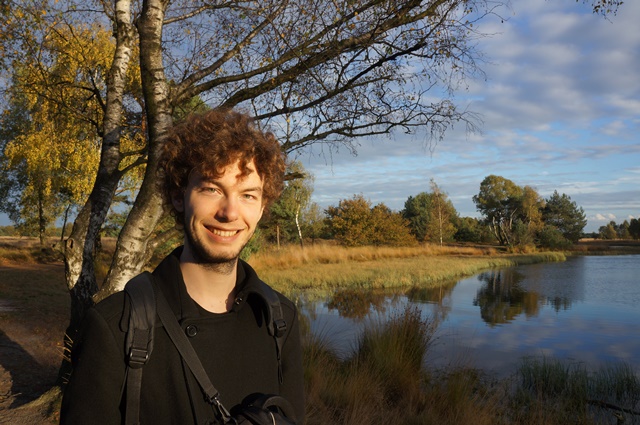7 May 2015
Dutch PhD student Thomas Blanken won one of the twenty prestigious Engineering Grants awarded by the European research organisation EUROfusion. These grants support talented young scientists in the field of fusion research. Blanken will be stationed at the Control Systems Technology group of Eindhoven University of Technology. He will focus on monitoring and control of the hot, turbulent plasma in a fusion reactor.
Normal021falsefalsefalseNLX-NONEX-NONE/* Style Definitions */table.MsoNormalTable{mso-style-name:"Table Normal";mso-tstyle-rowband-size:0;mso-tstyle-colband-size:0;mso-style-noshow:yes;mso-style-priority:99;mso-style-parent:"";mso-padding-alt:0cm 5.4pt 0cm 5.4pt;mso-para-margin:0cm;mso-para-margin-bottom:.0001pt;mso-pagination:widow-orphan;font-size:10.0pt;font-family:"Times New Roman",serif;}
 What drew you to a PhD in fusion research?
What drew you to a PhD in fusion research?
"During my university studies I started thinking on what to do after graduation. Solving technical problems for a company pursuing profits didn't appeal to me, I want to contribute to a more sustainable society. Fusion is an area where my expertise and my motivation meet and where I feel I can make a worthwile contribution, even though fusion will only become a practical energy source in time to come.
"My Master's thesis investigated how we can reconstruct and control the particle density in a fusion reactor in a detailed and reliable manner. This nicely fits into the work I will be doing as a post-doc."
What do you want to realise in the coming years?
"The topic I will look into is prevention of disruptions in tokamak fusion reactors by means of real-time monitoring and active control of the plasma conditions. Disruptions are an important reason to want to control the plasma; they can cause large quantities of energy to leak out of the reactor's magnetic confinement. This of course can have a very negative impact on the reactor.
"The question to answer is how we can get the right data out of a severely constrained number of diagnostics, derive the plasma condition and see if it is building up to a disruption, and if so, to apply the correct control strategy. In future fusion reactors such as ITER or DEMO, the automated control systems will be more and more constrained by the reactor's operational limits. A control system which can predict when such a limit is coming into view, can start preventive measures in an early stage."
How did you chose your home base for this research?
"My main contribution will be extending an existing algorithm for real-time reconstruction of the plasma state to an algorithm that can predict disruptions. The expertise in the Control Systems Technology group at Eindhoven University of Technology is an ideal fit to this topic: there is a lot of expertise here in both control systems and state reconstruction for tokamak plasmas.
Dutch PhD student Thomas Blanken won one of the twenty prestigious Engineering Grants awarded by the European research organisation EUROfusion. These grants support talented young scientists in the field of fusion research. Blanken will be stationed at the Control Systems Technology group of Eindhoven University of Technology. He will focus on monitoring and control of the hot, turbulent plasma in a fusion reactor.
Normal021falsefalsefalseNLX-NONEX-NONE/* Style Definitions */table.MsoNormalTable{mso-style-name:"Table Normal";mso-tstyle-rowband-size:0;mso-tstyle-colband-size:0;mso-style-noshow:yes;mso-style-priority:99;mso-style-parent:"";mso-padding-alt:0cm 5.4pt 0cm 5.4pt;mso-para-margin:0cm;mso-para-margin-bottom:.0001pt;mso-pagination:widow-orphan;font-size:10.0pt;font-family:"Times New Roman",serif;}
 What drew you to a PhD in fusion research?
What drew you to a PhD in fusion research?"During my university studies I started thinking on what to do after graduation. Solving technical problems for a company pursuing profits didn't appeal to me, I want to contribute to a more sustainable society. Fusion is an area where my expertise and my motivation meet and where I feel I can make a worthwile contribution, even though fusion will only become a practical energy source in time to come.
"My Master's thesis investigated how we can reconstruct and control the particle density in a fusion reactor in a detailed and reliable manner. This nicely fits into the work I will be doing as a post-doc."
What do you want to realise in the coming years?
"The topic I will look into is prevention of disruptions in tokamak fusion reactors by means of real-time monitoring and active control of the plasma conditions. Disruptions are an important reason to want to control the plasma; they can cause large quantities of energy to leak out of the reactor's magnetic confinement. This of course can have a very negative impact on the reactor.

"The question to answer is how we can get the right data out of a severely constrained number of diagnostics, derive the plasma condition and see if it is building up to a disruption, and if so, to apply the correct control strategy. In future fusion reactors such as ITER or DEMO, the automated control systems will be more and more constrained by the reactor's operational limits. A control system which can predict when such a limit is coming into view, can start preventive measures in an early stage."
How did you chose your home base for this research?
"My main contribution will be extending an existing algorithm for real-time reconstruction of the plasma state to an algorithm that can predict disruptions. The expertise in the Control Systems Technology group at Eindhoven University of Technology is an ideal fit to this topic: there is a lot of expertise here in both control systems and state reconstruction for tokamak plasmas.
Go to the News page.